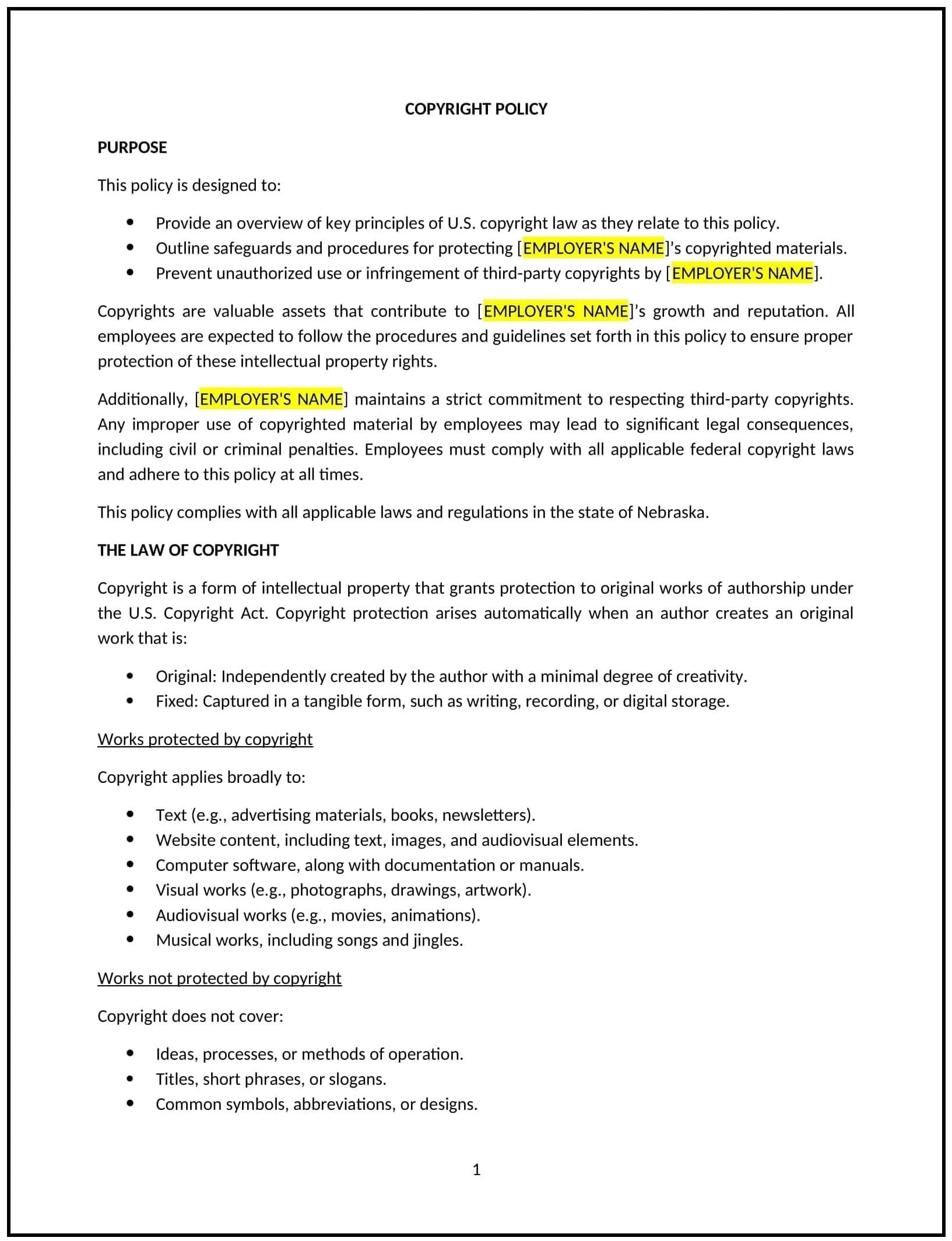Got contracts to review? While you're here for policies, let Cobrief make contract review effortless—start your free review now.

Customize this template for free
Copyright policy (Nebraska)
A copyright policy helps Nebraska businesses establish clear guidelines for the use of copyrighted materials, both within the organization and in its interactions with clients, partners, and customers. This policy outlines the steps employees should take to respect copyright laws, the procedures for using copyrighted works legally, and how the business should manage its own copyrighted content. It is designed to protect intellectual property, avoid legal disputes, and promote ethical business practices.
By adopting this policy, businesses in Nebraska can reduce the risk of copyright infringement, respect the rights of creators, and promote a culture of intellectual property awareness within the organization.
How to use this copyright policy (Nebraska)
- Define copyrighted works: Specify what constitutes copyrighted works, including books, music, software, logos, designs, and other creative materials. Outline the different types of copyright protections and which works fall under those protections.
- Set guidelines for using copyrighted materials: Outline how employees should use copyrighted works, including obtaining proper permissions, licensing agreements, or following fair use guidelines. Specify how to properly credit the owner of the copyrighted material.
- Address internal content ownership: Clarify who owns the copyrights to materials created within the company, including documents, software, marketing materials, and intellectual property developed by employees during their work.
- Define procedures for obtaining permission: Specify the process employees must follow to obtain permission to use copyrighted content, whether it is through licensing, permission requests, or other legal mechanisms.
- Outline consequences for infringement: Clearly state the potential consequences of violating the policy, including disciplinary action, legal action, or financial penalties, depending on the severity of the infringement.
- Establish procedures for protecting business copyrights: Include steps for protecting the company’s own intellectual property, such as registration, documentation, and enforcing rights against infringement by others.
- Review and update: Periodically review and update the policy to reflect changes in Nebraska laws, federal copyright regulations, or emerging industry practices related to copyright protection.
Benefits of using this copyright policy (Nebraska)
This policy provides several benefits for Nebraska businesses:
- Reduces legal risks: By adhering to copyright law, businesses minimize the risk of facing legal claims, fines, or lawsuits related to the unauthorized use of copyrighted content.
- Protects intellectual property: A well-structured policy helps ensure that the company’s own intellectual property is properly protected and that it can enforce its rights when necessary.
- Promotes ethical business practices: Encouraging respect for copyright laws helps foster a culture of integrity and professionalism within the company.
- Enhances brand value: By respecting copyright and creating original content, businesses strengthen their brand identity and reputation.
- Encourages innovation: Clear guidelines for intellectual property protection help businesses promote innovation and ensure that new works are properly protected and credited.
Tips for using this copyright policy (Nebraska)
- Communicate the policy clearly: Ensure that all employees understand the importance of respecting copyright laws and the proper procedures for using copyrighted materials in their work.
- Provide training: Offer regular training sessions on copyright law, fair use, and how to handle copyrighted content properly to reduce the risk of accidental infringement.
- Monitor usage: Periodically review the use of copyrighted materials within the organization to ensure that employees are following the policy and using materials legally.
- Keep records: Maintain documentation of permissions, licensing agreements, and any other legal documents related to copyrighted content used by the business.
- Enforce the policy: Ensure that the policy is consistently enforced, with clear consequences for violations and a process for addressing issues when they arise.